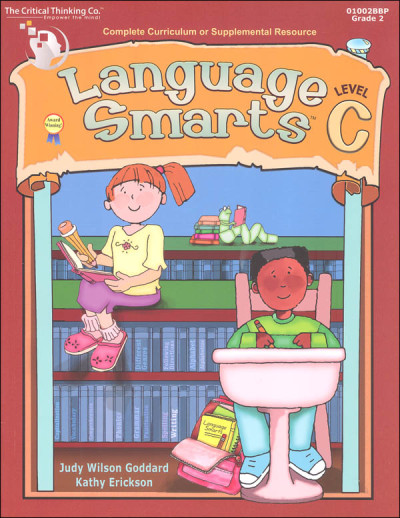We use cookies to make your experience better. To comply with the new e-Privacy directive, we need to ask for your consent to set the cookies. Learn more.
Language Smarts Book C
This workbook from The Critical Thinking Co.is filled with simple exercises, bright colors, and humor that make learning English skills much more enjoyable. The exercises improve skills in reading, writing, spelling, punctuation, grammar, and thinking.
Level C (2nd grade) starts with the alphabet, covers parts of speech more in depth, and introduces more writing skills.
Over 300 pgs, pb with answer keys.
The engaging lessons include easy-to-follow explanations, examples, and charts for visual learners—and there is no lesson preparation! Each lesson is followed by a variety of fun, colorful, mind-building activities that use different genres.
Learning English skills isn't always fun, but these workbooks make it so with simple exercises, bright colors, and some humor. Pages are full-color with bright and captivating graphics. The exercises help students improve skills in reading, writing, spelling, punctuation, grammar, and thinking. The worksheets can serve as the core curriculum for language arts or as a supplemental resource with plenty of extra practice. Exercise format varies through the books, but many of the activities require students to use critical thinking skills like convergent and divergent thinking as well as inductive and deductive reasoning. Examples of exercises are circling parts of speech in sentences, putting lists in alphabetical order, identifying errors in passages (like Editor in Chief, also from this publisher), punctuating sentences, changing singular to plural, using vowel digraphs to complete words, and much more. Each worksheet has up to 10 exercises, and instructions and explanations are simple and to the point. Topics and exercises become more advanced as the books progress, but they stay fun, colorful, and kid-friendly. The books are similar in format and content, but are tailored to specific grade levels. Level B (1st grade) starts with upper and lower case letters, introduces parts of speech, and begins touching on general writing skills. It has many more Editor in Chief exercises than Level C does. Level C (2nd grade) starts with the alphabet, covers parts of speech more in depth, and introduces more writing skills. Level D (3rd grade) covers blends, digraphs, diphthongs, grammar, punctuation, usage, literary elements, plot, using reference materials and more. Comprehensive in coverage, these books provide practice for all language arts skills needed at these levels. Over 300 pgs, pb with answer keys. ~ Rachel
| Product Format: | Paperback Book |
|---|---|
| Grade: | 2 |
| Brand: | Critical Thinking Company |
| ISBN: | 9780894558887 |
| Length in Inches: | 11 |
| Width in Inches: | 8.5 |
| Height in Inches: | 1 |
| Weight in Pounds: | 2.45 |
| Publication Date: | 2006 |


It was recommended by our Global Village School's Education Specialist for our daughter.
Friend recommended
Used Language Smarts Book B last year and really liked it!
My daughter loves this book! She likes that it changes to a different concept after so many lessons. The variety of lessons was very appealing to her.